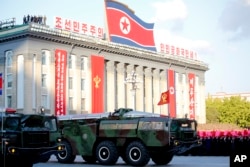North Korea’s recent responses to international sanctions and criticisms offer a key insight into how the isolated leadership in Pyongyang views itself as a nation under siege.
Following the latest round of United Nations Security Council sanctions imposed on North Korea for conducting its fifth nuclear test in September, Ja Song Nam, the U.N. Ambassador from the Democratic People's Republic of Korea (DPRK), defended his country’s efforts to strengthen its nuclear deterrence against the “ceaseless hostile moves” by the United States.
In a letter to the Security Council Ja said the U.S. is intent on the “political suffocation and system collapse” of the Kim Jong Un government, and alleged that following the 2012 death of North Korea leader Kim Jong Il, the U.S. “began to openly pursue the objective” of overthrowing the government in Pyongyang.
Also attached was a North Korean Foreign Ministry memorandum detailing an extensive list of alleged military provocations made by the U.S. including:
• Increasing the number of U.S. troops participating in joint military exercises with South Korea from 3,500 in 2013 to 27,000 in 2016.
• Deploying nuclear powered aircraft carriers and submarines as well as nuclear strategic bombers into the region.
• Practicing preemptive strike exercises to simulate taking control of the North’s nuclear facilities.
• Deployment of the U.S. THAAD missile defense shield in South Korea.
The U.S and its allies do not deny those actions, but argue they are taking stronger conventional military measures to counter the increasing North Korean nuclear threat that this year included two nuclear tests and numerous launches of ballistic missiles.
Libya
North Korean analysts point out that hardliners within the Pyongyang government placed new emphasis on maintaining a strong nuclear deterrent after witnessing the 2011 overthrow of Libyan dictator Moammar Gadhafi, with the assistance of a U.S.-led international military intervention, just a few years after he dismantled the country’s nuclear program.
The lesson was reinforced by Russia’s 2014 annexation of Crimea and incursions into Eastern Ukraine, decades after Kiev agreed to destroy thousands of nuclear warheads and ballistic missiles that were in its possession following the fall of the Soviet Union.
David Straub, the associate director of the Korea Program at Stanford University says he can understand North Korea’s siege mentality. However he argues that Pyongyang is not an innocent victim but a failing state that tries to use its nuclear arsenal to intimidate and force concessions from adversaries, and hypes the external threat to perpetuate the Kim family’s hold on power.
“North Korean leaders talk about the threat from the United States, but I think at their deepest fear is that of their own people, especially that one day, they might realize how much more successful the other Korean state to their south is, and that when people do so, they will rise up against them,” said Straub at a recent conference organized by the Korea Economic Institute of America.
Human rights
In its complaint to the U.N., Pyongyang also accused the U.S. of exaggerating human rights violations to undermine the nation’s legitimacy and independence, and to pressure other countries to reduce or sever ties with it.
Korea analyst Jonathan Pollack with the Brookings Institution says the Kim Jong Un government has been particularly sensitive to human rights criticism.
“There is no question but that the publicity given human rights in the North has gotten under the skin of the leadership of the North,” Pollack said at a recent North Korean human rights event at the Brookings Institution.
International condemnation of North Korea intensified following a 2014 U.N. Commission of Inquiry (IOC) report that compared ongoing atrocities in North Korea to those committed by Nazi Germany. The IOC report documented a network of political prisons in the country incarcerating nearly 120,000 men, women and children, as well as systematic torture, enslavement, rape and murder.
The U.N. General Assembly later voted to refer North Korea to the International Criminal Court for crimes against humanity, but the Security Council continues to be divided over endorsing the measure, with China and Russia blocking any further action.
In December the U.N. Security Council met for the third consecutive year to discuss alleged widespread human rights violations in North Korea.
In response Kim In Ryong, the DPRK Deputy Permanent Representative at the U.N. denied the allegations, criticized the U.S. for killing innocent civilians during its occupation of Iraq, and accused Washington of manipulating the Security Council to undermine the legitimacy of the Kim Jong Un government.
“The U.S. brought human rights issues of the DPRK to the U.N. Security Council, whose mandate has nothing to do with human rights issues. This is because the U.N. Security Council has been reduced to one where the U.S. remains unrivaled in high-handed and arbitrary practices in disregard of the U.N. charter and international law," he said.
However Robert King, the U.S. Special Envoy for North Korean Human Rights, argues it is appropriate to link North Korean human rights violations with security concerns and its aggressive pursuit of advanced nuclear and ballistic missile technology.
“A regime that puts the welfare and well-being of its own people well below its acquisition of nuclear weapons, will not hesitate to use those nuclear weapons against others,” King said at the Brookings Institution event.
Although North Korea refutes allegations of widespread human rights violations, it refuses to allow independent human rights organizations into the country to investigate these charges.
Youmi Kim in Seoul contributed to this report.






